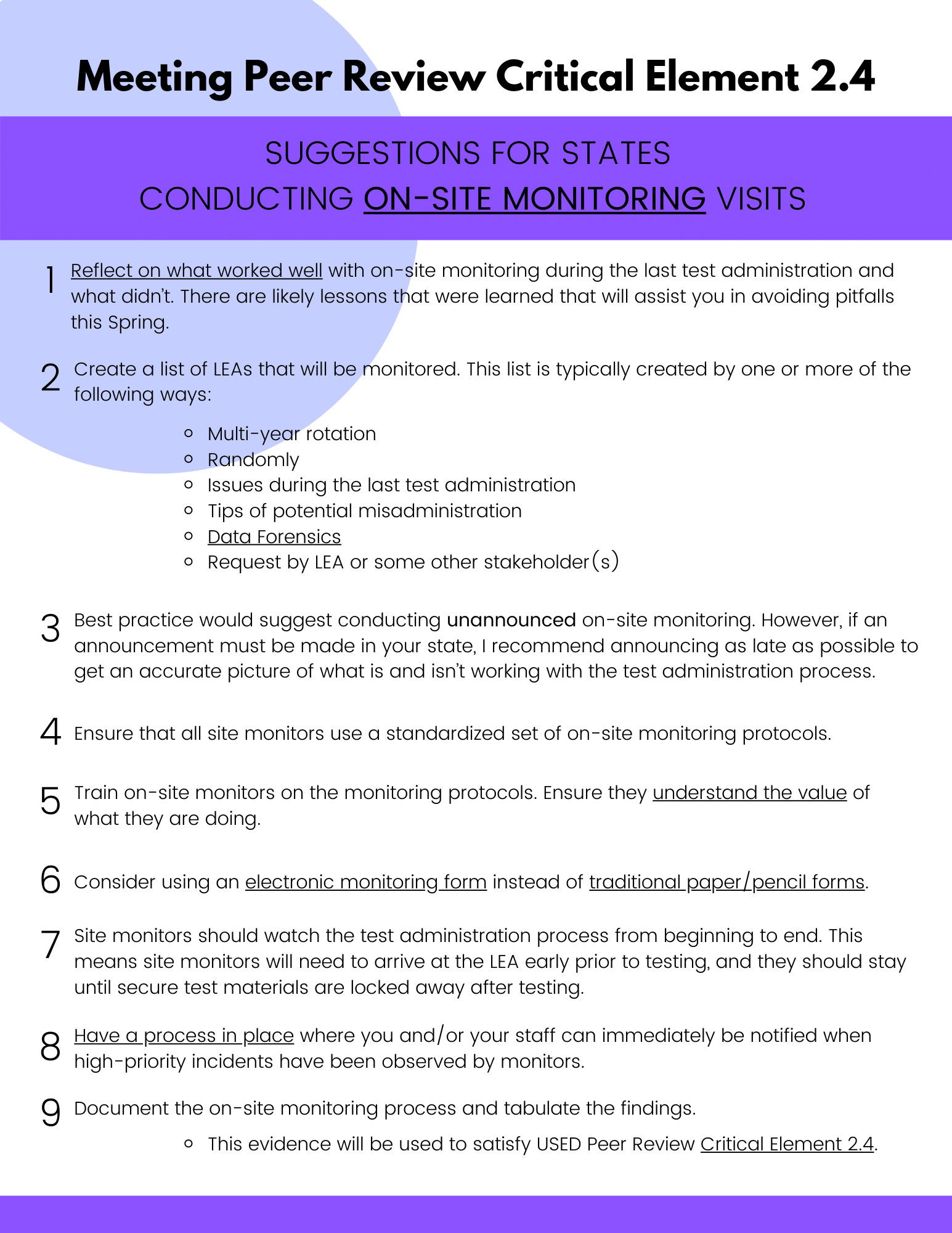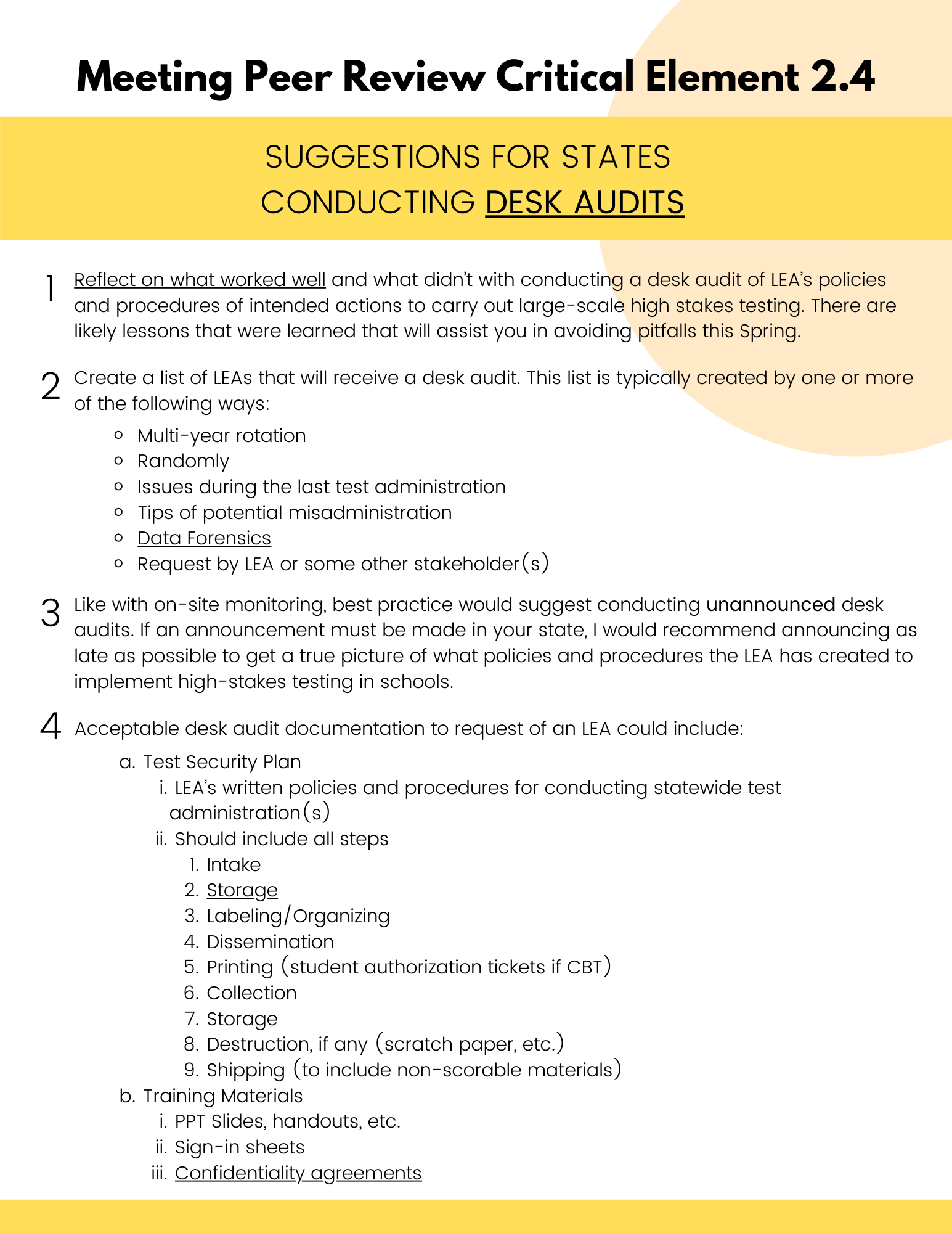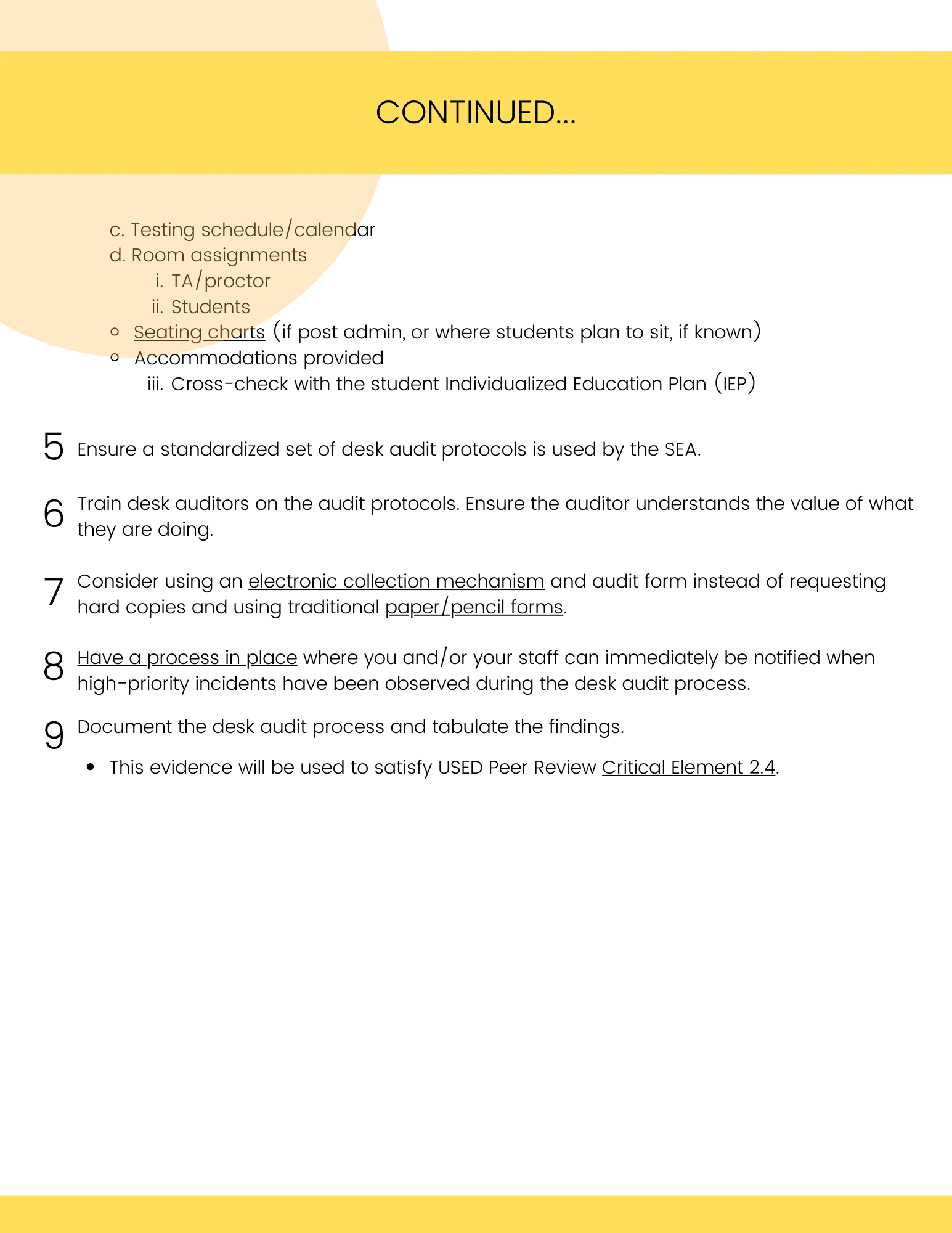CAVEON SECURITY INSIGHTS BLOG
The World's Only Test Security Blog
Pull up a chair among Caveon's experts in psychometrics, psychology, data science, test security, law, education, and oh-so-many other fields and join in the conversation about all things test security.
Site Monitoring or Desk Auditing to Meet Peer Review Critical Element 2.4
Posted by Walt Drane, Ed.S.
updated over a week ago
A Brief Explanation of Critical Element 2.4
As you prepare to meet Critical Element 2.4 of the Peer Review Requirements, you know you need to a) create your on-site monitoring plan or b) prepare for a desk audit if on-site monitoring is not feasible in your state due to the ongoing pandemic. This article will teach you how to meet CE 2.4 with either option—conducting on-site monitoring or desk audits—and walk you through the steps for each.
As a reminder, Critical Element 2.4 of the U.S. Department of Education (USED) Peer Review Process requires State Education Agencies (SEAs) to have an established monitoring of test administration policy. SEAs must show evidence that monitoring occurred according to the established policy. Specifically, on page 17, paragraph 2 of the Assessment Peer Review Process (found here), the USED states:
"For some critical elements, a State should consider providing two types of evidence: (1) evidence of State policy; and (2) evidence that the policy was carried out. For example, in Critical Element 2.4 – Monitoring Test Administration, a State should provide evidence of monitoring policies and protocols, as well as evidence that monitoring occurred. This could include a monitoring report or a list of recent monitoring activity.”
On-Site Monitoring vs. Desk Auditing
I have personally engaged in many on-site monitoring events both as a State Assessment Director and in my current role at Caveon. It has been my experience that physical on-site monitoring is much more effective than a desk audit of policies and procedures that a school or district intends to carry out during statewide testing.
That being said, I sympathize with states who have policies and procedures in place due to COVID-19 that restrict on-site monitoring in Local Education Agencies (LEAs—schools and districts). Conducting a desk audit of LEA policies and procedures is better than not doing anything at all, and it will allow the SEA to show evidence for Peer Review Critical Element 2.4.
Below are two lists of suggestions to help your state meet Peer Review Critical Element 2.4: The first list is for states who can conduct on-site monitoring visits, and the second list is for states who are conducting desk audits due to Covid restrictions or other mandates.
(Note: Click on the images below to open each list as a PDF. This will enable you to visit the different resources we've included in each of these documents.)
Walt Drane, Ed.S.
Walt Drane is an experienced K-12 large-scale assessment professional with a demonstrated history of working in the education management industry. In his role at Caveon, he is a strong business development professional who is skilled in the unique area of test security. His former experiences include serving as the Executive Director of the Offices of Assessment and District and School Performance for the Office of Accountability at the Mississippi Department of Education. There, he provided continued oversight and development over assessments in mathematics and English Language Arts for grades 3-8, science in grades 5 and 8, end-of-course high stakes assessments in the areas of Algebra I, English II, Biology I, and U.S. History, and alternate assessments for those students in grades 3-8 and 12 who have significant cognitive disabilities. He also led Mississippi’s Test Security Unit at the department of education and has led multiple large-scale investigations throughout the State of Mississippi to ensure the validity and reliability of state-wide assessment results. Mr. Drane has spoken at several national and international venues on various assessment topics, including the National Conference on Student Assessment (NCSA), National Council on Measurement in Education (NCME), the Conference on Test Security (COTS), Association of Test Publishers (ATP), and European Association of Test Publishers (E-ATP). Mr. Drane has also served as a high school assistant principal, athletic director, and elementary and middle school teacher. He holds a B.A. in Political Science with a focus on International Relations, a Certificate in Criminal Justice and Corrections, a Master’s degree in Education, and an Education Specialist degree in Educational Leadership.
View all articlesAbout Caveon
For more than 18 years, Caveon Test Security has driven the discussion and practice of exam security in the testing industry. Today, as the recognized leader in the field, we have expanded our offerings to encompass innovative solutions and technologies that provide comprehensive protection: Solutions designed to detect, deter, and even prevent test fraud.
Topics from this blog: K-12 Education
Posts by Topic
- Test Security Basics (34)
- Detection Measures (29)
- K-12 Education (27)
- Online Exams (21)
- Test Security Plan (21)
- Higher Education (20)
- Prevention Measures (20)
- Test Security Consulting (20)
- Certification (19)
- Exam Development (19)
- Deterrence Measures (15)
- Medical Licensure (15)
- Web Monitoring (12)
- DOMC™ (11)
- Data Forensics (11)
- Investigating Security Incidents (11)
- Test Security Stories (9)
- Security Incident Response Plan (8)
- Monitoring Test Administration (7)
- SmartItem™ (7)
- Automated Item Generation (AIG) (6)
- Braindumps (6)
- Proctoring (4)
- DMCA Letters (2)
Recent Posts
SUBSCRIBE TO OUR NEWSLETTER
Get expert knowledge delivered straight to your inbox, including exclusive access to industry publications and Caveon's subscriber-only resource, The Lockbox.




